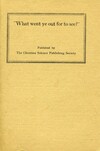Jesus the Christ
Originally published in the 1915 pamphlet titled “‘What went ye out for to see?’”
It was in the days of the great feast, during which, when all the surrounding lights had been quenched, the golden candlestick in the court of the women was illuminated so as to flame out in the darkness on Mount Moriah, that Jesus startled the Pharisees by crying aloud to the people, "I am the light of the world." The Pharisees, always suspicious of anything which might tend to depreciate the dignity of the hierarchy, at once concluded he was referring to himself. A few moments later he made it perfectly clear that he was referring to the Christ, though the hardened materialism of the Pharisees failed to understand him. They had bitterly taunted him with having said that Abraham had rejoiced to see his day, and had seen it, and was glad. "Thou art not yet fifty years old, and hast thou seen Abraham?" they jeered. Then it was that Jesus of Nazareth made that unmistakable statement of the spirituality of the Christ,—"Before Abraham was, I am."
In those words Jesus not only showed how it was that he was entitled to the name of Christ, but even how it was that the writer of the Messianic prophecies should have been able centuries earlier to paint, in the prophecies of the servant of Jehovah, the picture of the man who would manifest the Christ. The writer of these prophecies had seen the turmoil which would be manifested in the world when there arose a man of such purity of thought that those about him would be maddened by his adamantine statements of the truth. Such a man would faithfully set forth the law, so that his commands would carry, not through the tiny province of Judaea alone, but throughout the world. Such a man would certainly not be broken in spirit, but would meet the animality of the world without fear. Such a man would proclaim a gospel as much for the Gentile world as for the Hebrew. Such a man would not be rebellious but obedient to divine law; and his very obedience to that law would make him, in his effort to prove the nothingness of materiality, apparently subject to the forces of materiality. Such a man, amidst the passions and brutalities of the flesh, would undoubtedly seem "smitten of God, and afflicted," because the flesh would be absolutely unable to appreciate the true meaning of the crown of thorns and the scepter of a reed, and so incapable of appreciating in the crucified Saviour the victory of the risen Christ.
What, of course, Jesus meant was that the Christ was the spiritual idea, coeval with divine Principle, and that every one from the time of Abraham, as the Jews counted time, who had ever understood anything of Principle, had in that measure seen the Christ. The whole story of the Bible from Genesis to Revelation is the story of the gradual dawning of the Christ, Truth, on human perception, so that "the deep" over which the darkness brooded, and which to the writer of Genesis stood as a synonym for all evil, was, according to the last verses of Revelation, to disappear in the light of the truth generated through an understanding of the Christ. Abraham had seen the Christ when Truth led him to abandon polytheism and go out alone to establish the monotheism of Israel. Jacob had seen the Christ that night when, sleeping under the stars by the brook Jabbok, he struggled with his belief of evil until he overthrew it. Moses had seen the Christ when he stretched forth his hand over the Red sea and the Israelites passed over on dry ground. Elisha had seen the Christ when "the chariot of Israel, and the horsemen thereof," appeared to him. Isaiah had seen the Christ when he proclaimed the fact that sacrifice was the abandonment of sin, and not the horrible slaughter of animals. Finally, John the Baptist had seen the Christ when he preached the gospel of purity and restraint to men. All these men had some vision, however slight, of the absolute scientific Truth which had existed before Abraham, and the availability of which Jesus of Nazareth had demonstrated ever since that day when as a boy in the temple he declared that he must be about his Father's business.
Enjoy 1 free Sentinel article or audio program each month, including content from 1898 to today.



